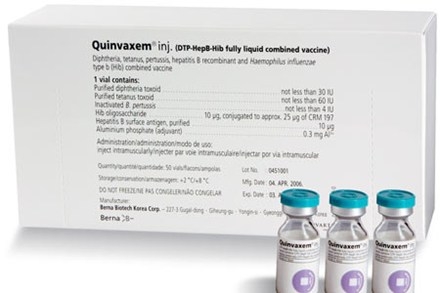WHO investigates vaccine case
The suspension is for further investigations in combination with the World Health Organisation (WHO). WHO Vietnam spoke to VIR’s Thanh Tung about the vaccine and investigation.

What can the WHO do to help Vietnam find the causes of these accidents?
In addition to providing technical assistance and support to the Ministry of Health for the investigation, WHO is reviewing manufacturing and quality aspects of the vaccine lots involved. The manufacturer has fully cooperated with every aspect of the inquiry. The WHO has also involved the Global Advisory Committee on Vaccine Safety (GACVS), which is an independent group of global experts who have considerable experience of advising on vaccine safety and investigating such events.
How have the investigations been implemented?
In April, a team of international experts from the WHO, UNICEF and the GACVS travelled to Vietnam to work with experts from the National Institute of Hygiene and Epidemiology and the Department of Preventive Medicine at the Ministry of Health in Hanoi. Together they reviewed the 43 cases of serious adverse events following immunisation that have been reported since Quinvaxem was introduced in mid-2010. Following a thorough review the team concluded that no elements from the cases they examined would suggest an issue with the safety or quality of the vaccine. As an extra precaution, the government has sent samples of the vaccine to a specialist laboratory in the UK to conduct additional tests and the results are expected in about a month’s time.
How is Quinvaxem vaccine being used in other nations? Are the same accidents found in these nations?
Since Quinvaxem was prequalified by WHO in 2006, more than 400 million doses of vaccine have been safely administered in more than 90 countries. This confirms that Quinvaxem and other similar pentavalent (five-in-one) vaccines are extremely safe.
Serious adverse events following vaccination with Quinvaxem have also been reported from Sri Lanka, Pakistan, Chile and Brazil. As in the case of Vietnam, their investigations did not show a causal link between the administration of the vaccine and any of the subsequent events.
Like other vaccines, Quinvaxem can sometimes cause minor reactions such as fever, or temporary inflammation. Although very rare, some children can have a more serious allergic reaction to a particular vaccine.
What will be Berna Biotech Korea Corporation's responsibilities for these accidents?
Neither the adverse events investigation nor the technical tests that have been conducted on the vaccine itself have identified any problems with the safety or quality of the vaccine.
What is the WHO's advice for Vietnam's authorities and people about the use of vaccines including Quinvaxem?
Ensuring that every child is fully immunised remains one of the most important responsibilities of both the government, as well as parents. We hope that a decision on resumption of its use could be taken after completion of the on-going investigation.
Although Quinvaxem remains temporarily suspended, other vaccines and services are still available. Unless advised otherwise, parents and caregivers should continue to take their infants to the health centre on time to ensure that they receive the other essential childhood vaccines and package of services as normal.
It is important to remember that vaccines are very safe. Most vaccine reactions are usually minor and temporary, such as a sore arm or mild fever. Very serious health events are extremely rare and as this situation demonstrates, they are very carefully monitored and investigated in Vietnam. Parents should remember that infants are far more likely to be seriously injured by a vaccine-preventable disease than by a vaccine.
For example, in the case of polio, the disease can cause paralysis, measles can cause encephalitis and blindness, and some vaccine-preventable diseases can even result in death. While any serious injury or death caused by vaccines is one too many, the benefits of vaccination greatly outweigh the risk, and many, many more injuries and deaths would occur without vaccines.
What the stars mean:
★ Poor ★ ★ Promising ★★★ Good ★★★★ Very good ★★★★★ Exceptional
Latest News
More News
- 14th National Party Congress wraps up with success (January 25, 2026 | 09:49)
- Congratulations from VFF Central Committee's int’l partners to 14th National Party Congress (January 25, 2026 | 09:46)
- List of newly-elected members of 14th Political Bureau announced (January 23, 2026 | 16:27)
- 14th Party Central Committee unanimously elects To Lam as General Secretary (January 23, 2026 | 16:22)
- List of members of 14th Party Central Committee announced (January 23, 2026 | 09:12)
- Highlights of fourth working day of 14th National Party Congress (January 23, 2026 | 09:06)
- Press provides timely, accurate coverage of 14th National Party Congress (January 22, 2026 | 09:49)
- Press release on second working day of 14th National Party Congress (January 22, 2026 | 09:19)
- Minister sets out key directions to promote intrinsic strength of Vietnamese culture (January 22, 2026 | 09:16)
- 14th National Party Congress: Renewed momentum for OVs to contribute to homeland (January 21, 2026 | 09:49)
















 Mobile Version
Mobile Version